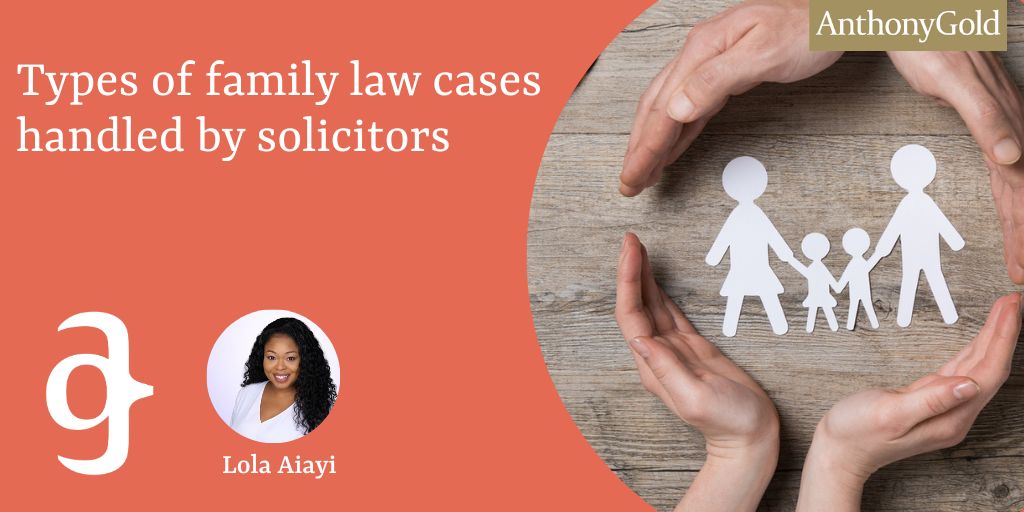Types of family law cases handled by solicitors

Whether you’re starting a new relationship, parting ways with a loved one, or facing changes within your family, understanding the legal aspects is crucial. Family Law solicitors guide you through these intricate processes with expert advice and support. In this blog, we’re going to delve into the various types of Family Law cases, shedding light on how solicitors can assist you in different situations.
What does a family law solicitor deal with?
Family Law is one of the few areas of law that most people will need at some point in their lives. The start of a relationship, the end of a relationship or even a change in the dynamics of your family (money, inheritance, property, children, health, conflict and abuse) can trigger a need for immediate legal advice.
Every case is different, so it is really important that you obtain legal advice as early as possible so that you can make informed decisions. Solicitors specialising in Family Law can advise and assist on a wide range of issues concerning families and relationships. However, there are various categories of Family Law advice, and we have broken these down into key sections.
What are the different types of family law cases and orders available within the UK?
Dispute Resolution and Non-Court Options
There is a misconception that all family solicitors are litigious and can only assist when matters are heading to Court. However, not all cases need to go to Court and Court should only be a last resort.
At the outset, a family solicitor can assist you with resolving any disputes privately, flexibly and out of Court. For example, this can be done by first providing you with legal advice in the background whilst you correspond directly with the other person or attend mediation. If you are unable to agree matters on your own, we can write on your behalf and explore other non-Court options with you.
At Anthony Gold, we have trained and accredited mediators who have specialist skills and training to work with your family to reach an amicable solution. We also offer various other options where you can work together to reach an agreement out of court such as collaborative practice and one solicitor solutions. We can also facilitate round table discussions, arbitration, private FDR’s and early neutral evaluation.
Read more about our mediation and non-court options.
Divorce, Dissolution and Separation
Ending a relationship is difficult. In the first instance, a family solicitor can offer you advice on what your options are even if you are not ready to go through the process formally.
There are now three stages to a ‘no fault’ divorce or dissolution.
The divorce application – This can be done as a joint or sole application.
The acknowledgement of service – The Court then send the application and documents to the other person to confirm that they have received the application and state whether they agree or contest the divorce.
The conditional order – This is the interim stage of your divorce and cannot be applied for until a 20-week holding period has lapsed. The holding period is usually used to discuss and deal with finances.
The final order – This formally ends your divorce/dissolution and must not be applied for before settling your finances. You cannot apply for this order until 6 weeks and one day from your conditional order.
Read more about our services related to divorce, dissolution and separation.
Financial Arrangements
A family solicitor can also assist you with financial arrangements, to negotiate and resolve matters in relation to assets, income and any other financial arrangements between you and your ex-spouse/partner in an amicable manner.
Family solicitors are used to dealing with both complex and simple matters and can assist with a wide variety of matters including those involving high net worth (HNW) and ultra-high net worth (UHNW) finances such as trust funds, significant pensions, inheritance, complex estates and offshore assets.
We also assist with declarations of trust, cohabitation agreements, prenuptial or pre-civil partnership agreements, postnuptial or post-civil partnership agreements.
We can also assist you with obtaining valuations of business assets and pensions, registering your rights to the family home, transferring your tenancy and severing a joint tenancy.
If an agreement cannot be reached, a family lawyer can advise and guide you through the legal formalities to assist you with applying for an order and initiating proceedings.
The typical orders available to you under this area of law are financial remedy orders including clean break consent orders, pension sharing orders, property adjustment orders to transfer or sell property, periodical payment orders, maintenance orders or lump sum orders.
Child Arrangements
It can be difficult to navigate the ending of a relationship as you may still need to make decisions regarding your children such as where they will live, how much time they will spend with the other parent, which school they will attend, what their religious upbringing will be, changing their name and whether they can undergo any medical treatments or procedures.
We will first advise you on your options and can advise you in the background as it is always best to reach an agreement between yourselves or in mediation, wherever possible. If you are unable to reach an agreement, we can assist you via solicitor correspondence to negotiate a parenting plan or agreement and, as a last resort, advise you in relation to initiating proceedings.
If an agreement cannot be reached, a family lawyer can advise and guide you through the legal formalities to assist you with applying for an order and initiating proceedings.
The main orders available to you under this area of law are child arrangements orders, specific issue orders and prohibited steps orders. In family law, we no longer use the words ‘custody’ or ‘residence’ and instead the Court can make an order regulating who the child ‘lives with’ and ‘spends time’ with.
Surrogacy and Adoption
With heightened awareness of reproductive options, more intended parents attending fertility clinics and the growth of same sex couples exploring their parental options, there has been an increase in parents seeking advice in relation to surrogacy, parental orders and adoption orders.
Protection from Domestic Abuse
If you have experienced domestic abuse then we can advise you on the protective measures available to you to ensure that you, and any children, are kept safe. Depending on the urgency of your situation, a family solicitor could firstly assist you by writing a warning letter on your behalf to the other person.
If this is not sufficient or if you require urgent protection, we can advise and assist you with obtaining an injunction via the Family Court.
A non-molestation order can protect you and your child(ren) from abuse and/or harassment.
An occupation order regulates who lives in the property and/or who lives in which part of the property.
A prohibited step order stops a parent from exercising their parental responsibility in relation to a child e.g. going to the school to collect the child(ren) or remove them from the other parent’s care.
If you are not sure whether the advice you require is one that a family solicitor can assist with, please contact us on 020 7940 4000 and we can let you know.
* Disclaimer: The information on the Anthony Gold website is for general information only and reflects the position at the date of publication. It does not constitute legal advice and should not be treated as such. It is provided without any representations or warranties, express or implied.*
No comments